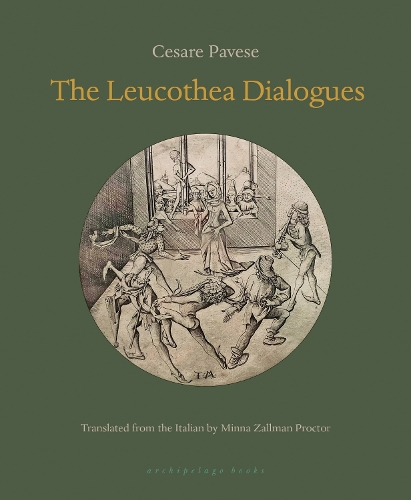
The Leucothea Dialogues
(Paperback)
Publishing Details
The Leucothea Dialogues
By (Author) Cesare Pavese
By (author) Minna Zallman Proctor
Archipelago Books
Archipelago Books
25th November 2025
14th October 2025
United States
Classifications
General
Fiction
Physical Properties
Paperback
250
Width 152mm, Height 165mm
Description
A shifting, primordial work by Cesare Pavese, plumbing the netherworlds of philosophy, myth, human feeling, and mortality Above all Pavese's novels are works of an extraordinary depth where one never stops finding new levels, new meanings . . . Each one of Pavese's novels revolves around a hidden theme, something unsaid which is the real thing he wants to say. - Italo Calvino A shifting, primordial work by Cesare Pavese, plumbing the netherworlds of philosophy, myth, human feeling, and mortality "Above all Pavese's novels are works of an extraordinary depth where one never stops finding new levels, new meanings . . . Each one of Pavese's novels revolves around a hidden theme, something unsaid which is the real thing he wants to say." - Italo Calvino Cesare Pavese's The Leucothea Dialogues is peopled with gods, centaurs, clouds, poets, hunters, snakes, and nymphs. These are the beings who spoke to him through the ancient plays and poems he read in primary school. Here they speak again in the twenty-seven dialogues that form the novel. Pavese calls mythology a "hothouse of symbols." His hothouse is liveliest at night, in the peculiar clarity of darkness. Pavese's characters are more than "characters," they play like the dreams of earliest childhood, they pose questions that seem to travel through the minds of the dead to the minds of the living and back again. Through reeds, shadows, glens, fields of blazing straw, homes and villages on the edges of valleys, and over cliffs, we follow their harried stories. In Minna Zallman Proctor's radiant translation, The Leucothea Dialogues is an expression of an exhilarating intelligence.
Reviews
"Pavese, to me, is a constant source of inspiration." Jhumpa Lahiri
"There can be no excuse for not reading Pavese, one of the few essential novelists of the mid-twentieth century." Susan Sontag
"This is how writers in our ever-worsening world should write." Saul Bellow
"Pavese's nine short novels make up the most dense, dramatic and homogeneous narrative cycle of modern Italy, and are also . . . the richest in representing social ambiances, the human comedy, the chronicle of a society. But above all they are works of an extraordinary depth where one never stops finding new levels, new meanings . . . Each one of Pavese's novels revolves around a hidden theme, something unsaid which is the real thing he wants to say." Italo Calvino
"There is something about Pavese . . . that is insinuating, haunting and lyrically pervasive." The New York Times Book Review
"One of the word's great creative depressives." Tim Parks, The Daily Telegraph
"There is nothing with quite this passionate intensity and purity in American poetry . . . Hard Labor shows us Pavese at the outset of his own ultimately tragic career, writing poetry of courageous originality, intelligence, and power." Jonathan Galassi, The New York Times
"Cesare Pavese is one of those singular, disruptive poets, like Blake or Lawrence, who go against the grainor the flowof their culture, and for whom precedents would be as hard to find as successors . . . His marvellously peopled poems not only document the timewhat Calvino called 'the Pavese era'but also bear witness to a unique and restless intelligence." Jamie McKendric, The Guardian
Author Bio
Cesare Pavese (1908-1950)was born in the countryside near Turin in northern Italy. His translations of Hermann Melville, James Joyce, Gertrude Stein, andDaniel Defoe influenced his contemporaries, and the wider reading public. Pavese also worked at the Turin publisher Einaudi, where he went on to become the editorial director. He wrote poetry, essays and fiction, and kept diaries. In 1950, Pavese won the Strega Prize, Italy's most prestigious award for literature, for The Moon and the Bonfires. Later the same year, he committed suicide. Minna Zallman Proctor is the author of Landslide- True Stories (2017) and the editor of The Literary Review. Her essays have appeared in Bookforum, The Nation, and The New York Times Book Review, among other publications. Proctor's translation of Love in Vain, Selected Stories of Federigo Tozzi won the PEN Poggioli Prize. Her translations include Fleur Jaeggy's These Possible Lives, Natalia Ginzburg's Happiness, as Such, Bruno Arpaia's The Angel of History, and essays by Umberto Eco, and Pier Paolo Pasolini.
